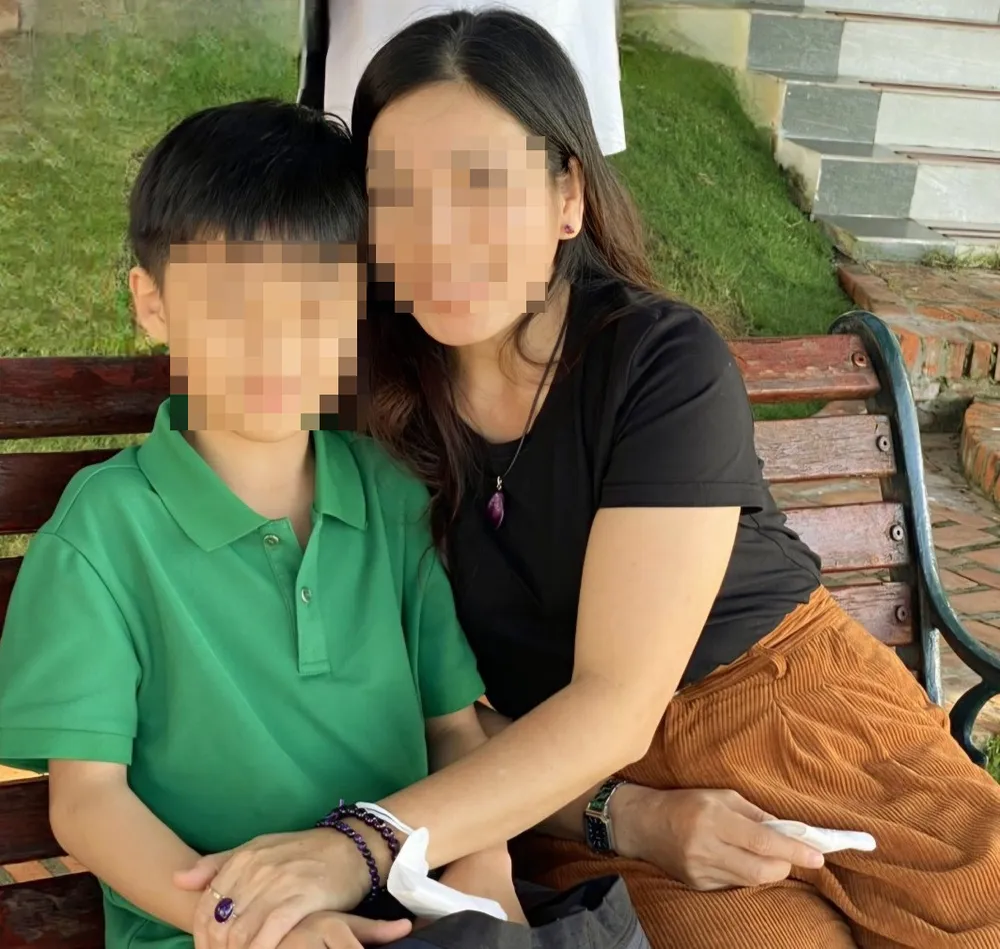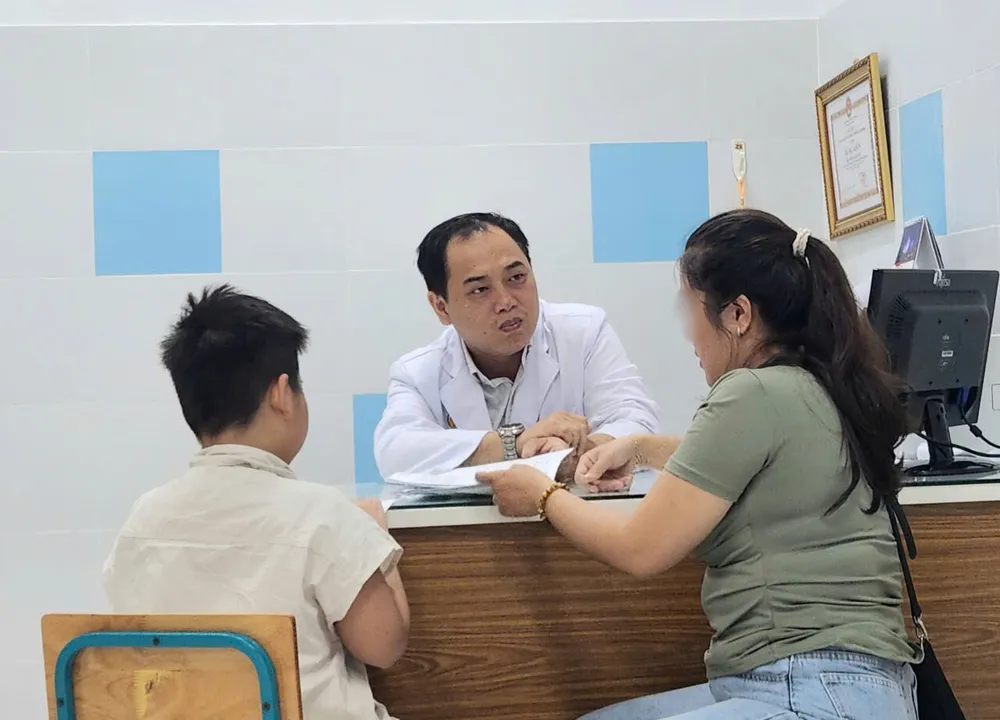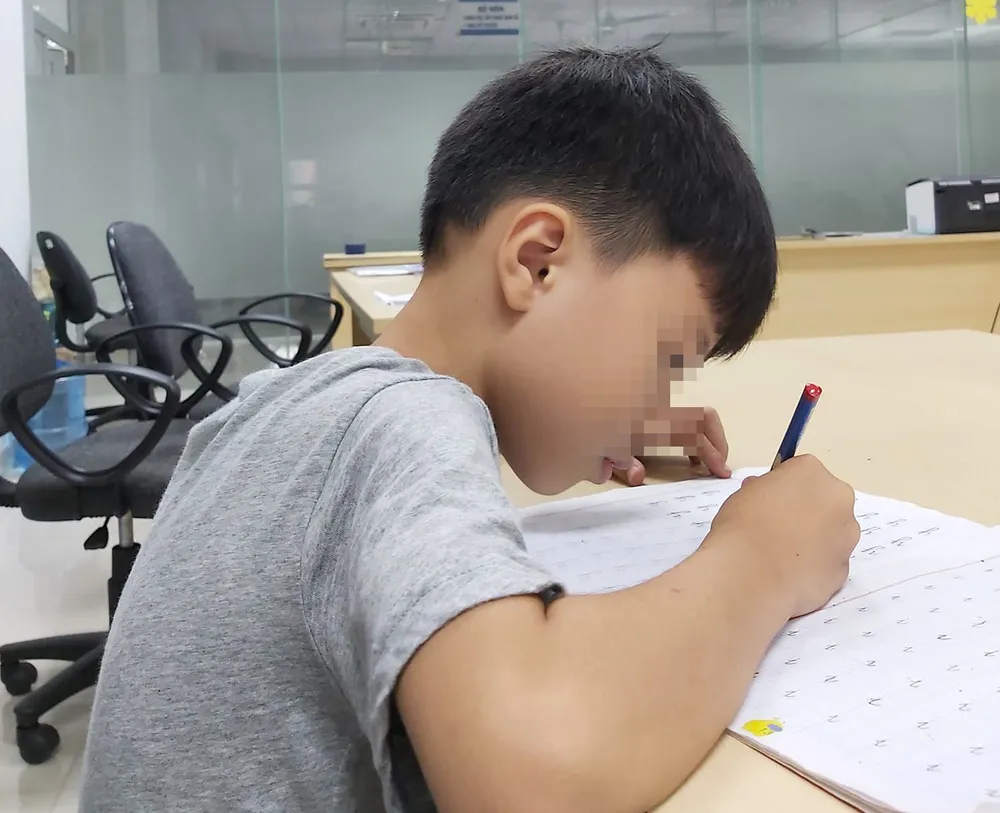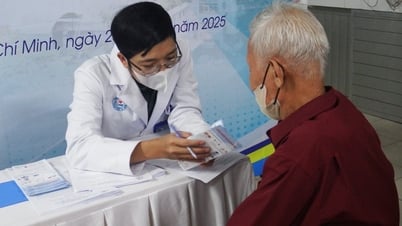Mother and child's journey of a thousand miles
Two years after giving birth, Ms. Tran Thi Thuc Anh (47 years old, living in Dong Nai province) was devastated when her son was diagnosed with autism. Despair enveloped her every time she saw her son silently watching inanimate moving objects, such as wheels and electric fans, without communicating with the world around him.
Whenever he wanted to get his toys, the boy would just cry loudly to attract attention. After a few days of trying to regain his composure, the couple took their son to the North and South to see doctors at major hospitals, but the results were the same.
Since then, Ms. Thuc Anh has been inseparable with her son, traveling dozens of kilometers every day from Dong Nai to Ho Chi Minh City so that her son can attend autism intervention classes at Children's Hospital 1, learn speech therapy, learn special intervention, etc. A year later, she divorced and raised her son alone.

The teacher's income is not enough to support the classes of autistic children, but she has not given up for the past 8 years. Not letting her mother down, up to now, the boy NTL has qualified to study in an integrated primary school, is good at math, knows how to help his mother wash dishes and clean the house.
After being granted a certificate of severe disability, the boy received a monthly allowance from the ward People's Committee as a way to encourage and share with his mother. However, NTL's pronunciation was still very difficult, and he sometimes screamed and jumped with excitement.
“When I first started my journey, I just hoped that my child could be proactive in his personal life so that he would not be despised or looked down upon. Now, he can do more than that. If only I had known about autism earlier, he might not have missed out on the golden time,” Thuc Anh confided.
Mothers' regret and remorse are common in the Psychology Department, Children's Hospital 2 (HCMC).
A year ago, Ms. TTT (living in Ho Chi Minh City, working as a scrap collector) discovered that her 3-year-old son was autistic and hyperactive. With no money to send her son to daycare, Ms. T. often drove him everywhere to make a living, unaware that her son was developing abnormally. Despite blaming herself, Ms. T. did not accept her fate and persevered in taking her son to the hospital every month, with both material and spiritual support from the doctors.

At the Psychology Department of Children's Hospital 2 alone, about 500 children come to see a doctor each month for autism and hyperactivity. The rate of autistic children at Children's Hospital 1 also fluctuates between 1.5-2% (2021-2022).
Meanwhile, 2019 data from the General Statistics Office shows that there are about 1 million autistic people in Vietnam, with autistic children accounting for 1% of all newborns. This number is increasing compared to the past due to increased awareness among parents, and children being examined earlier instead of avoiding it as before.
More policies to support autistic children
Dr. Tran Quang Huy, Department of Psychology, Children's Hospital 2 (HCMC), said that currently, examination and intervention for autistic children have had encouraging improvements. The opportunity for intervention and treatment for autistic children has also increased significantly.
Previously, parents had to make an appointment about a month in advance to get their children examined for autism and receive psychological counseling. This number has been somewhat shortened after children's hospitals in Ho Chi Minh City improved their procedures and increased their staff.
According to Dr. Tran Quang Huy, awareness among parents and society has increased; autistic children in Vietnam are recognized as disabled, and if the level is severe, they will receive monthly support from the State. At the same time, children are integrated into a normal educational environment, reducing stigma and discrimination.
However, medicine has not yet found a cure for autism, so intervention and treatment have no precise stopping point. Meanwhile, health insurance coverage for children with autism is still very limited. Parents have to pay for speech therapy, behavioral therapy and physical therapy services - an economic burden that leaves many families exhausted.
It is worth noting that parents, especially mothers, have to spend almost all of their time, health and life to accompany their autistic children. Not only do they have to endure social pressure, mothers may also be disadvantaged and discriminated against at work.
Therefore, Dr. Tran Quang Huy suggested that businesses and organizations need to pay attention to parents with autistic children, design policies to support and encourage them in a practical way.

Not to mention, the current number of pediatric psychiatrists does not meet the demand, leading to a situation of patient accumulation and parents having to wait for a long time. For example, Children's Hospital 2 (HCMC) currently has 4 pediatric psychiatrists - the most among children's hospitals in HCMC. Meanwhile, autism intervention requires a team of doctors, psychologists, and special education specialists to coordinate effectively and synchronously.
Dr. Dinh Thac, Head of the Psychology Department, Children's Hospital 1 (HCMC), is concerned that many parents are currently choosing the wrong intervention method for autistic children.
First, families mistakenly believe that their children will gradually develop normally, thus missing the "golden period" for treatment. Second, families listen to other people's advice or buy illegal drugs, putting their children in danger. In addition, many parents believe that they can intervene with autistic children independently, instead of needing the cooperation of medical professionals.
Experts estimate that each autistic child will directly affect 8 people. Every year, a large number of autistic children enter adulthood, facing an uncertain future when their parents are old and weak, unable to work to support themselves. The future of autistic children without parents is also a social security issue that needs to be calculated and improved soon.
“Overseas, there are some career guidance models for autistic children. People focus on the children’s talents and develop those talents to serve specific jobs. Our country currently does not have a similar model to replicate, support the future of children as well as reduce the burden on parents. Hopefully, new policies will be timely to help parents with autistic children no longer be alone.”
- Dr. Tran Quang Huy, Department of Psychology, Children's Hospital 2 (HCMC) -
Source: https://www.sggp.org.vn/tiep-suc-tre-tu-ky-post809585.html



![[Photo] Prime Minister Pham Minh Chinh chairs the meeting of the Government Party Committee Standing Committee](https://vphoto.vietnam.vn/thumb/1200x675/vietnam/resource/IMAGE/2025/8/23/8e94aa3d26424d1ab1528c3e4bbacc45)
![[Photo] General Secretary To Lam attends the 80th Anniversary of the Cultural Sector's Traditional Day](https://vphoto.vietnam.vn/thumb/1200x675/vietnam/resource/IMAGE/2025/8/23/7a88e6b58502490aa153adf8f0eec2b2)































































































Comment (0)